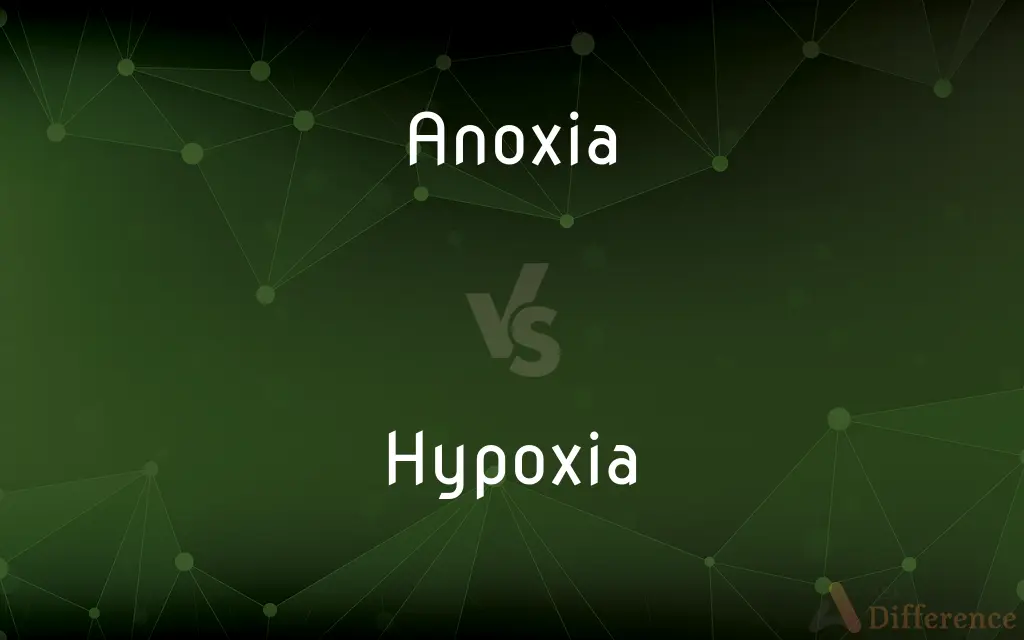Anoxia vs. Hypoxia — What's the Difference?
By Tayyaba Rehman & Maham Liaqat — Updated on April 25, 2024
Anoxia refers to a complete absence of oxygen in tissues, while hypoxia indicates reduced but not entirely absent oxygen levels.

Difference Between Anoxia and Hypoxia
Table of Contents
ADVERTISEMENT
Key Differences
Anoxia is a condition where there is no oxygen available to a part of the body or an entire organism, which can lead to severe tissue damage or death. Hypoxia, on the other hand, is characterized by insufficient oxygen levels, which can still sustain life but under impaired conditions.
In medical contexts, anoxia can result from severe situations like cardiac arrest or choking, where oxygen supply is completely cut off. Hypoxia might be caused by less extreme conditions such as high altitudes or respiratory diseases, where oxygen is reduced but present.
The consequences of anoxia are typically more severe and immediate, given that cells can begin to die within minutes without oxygen. In contrast, hypoxia may lead to complications over a longer period, depending on the degree of oxygen deprivation.
Treatment approaches for anoxia require rapid response to reintroduce oxygen to the tissues, often involving resuscitation or high-flow oxygen. For hypoxia, treatment might focus on addressing the underlying causes, such as improving ventilation or increasing oxygen concentration in the blood gradually.
Anoxia is generally less common than hypoxia, as it requires a complete cessation of oxygen supply, whereas hypoxia can occur in various clinical and environmental situations, making it a more frequently encountered issue.
ADVERTISEMENT
Comparison Chart
Definition
Complete absence of oxygen in tissues
Reduced oxygen availability in tissues
Severity
More severe, can lead to rapid cell death
Less severe, varied impact on function
Common Causes
Cardiac arrest, severe respiratory failure
High altitude, lung diseases, anemia
Treatment
Immediate oxygenation, resuscitation
Oxygen therapy, treat underlying cause
Long-term Effects
Potentially fatal if not quickly treated
Can be chronic, leading to organ damage
Compare with Definitions
Anoxia
A condition in which there is an absence of oxygen supply to an organ or tissue.
Anoxia can occur during a prolonged cardiac arrest.
Hypoxia
Reduced oxygenation at the tissue level, which can impair cell function.
Muscle fatigue during exercise can be a sign of hypoxia.
Anoxia
Absence of oxygen in any form.
Anoxia at high altitudes can be fatal without proper acclimatization.
Hypoxia
A condition in which the body or a region of the body is deprived of adequate oxygen supply.
Hypoxia is common in patients with chronic respiratory diseases.
Anoxia
Total depletion of oxygen in a given environment.
The sealed container created an anoxic environment unsuitable for aerobic life.
Hypoxia
A medical condition where oxygen fails to reach tissues adequately.
Sleep apnea often causes nighttime hypoxia.
Anoxia
A severe form of hypoxia resulting in extreme oxygen deprivation.
Anoxia in the brain can lead to irreversible damage within minutes.
Hypoxia
Insufficient oxygen levels affecting an organism’s metabolism.
Hypoxia in high-altitude climbers requires gradual acclimatization.
Anoxia
A pathological condition caused by inadequate oxygen.
Immediate treatment for anoxia is critical to prevent lasting damage.
Hypoxia
An environmental condition where oxygen levels are below normative ranges.
Water bodies can experience hypoxia leading to fish kills.
Anoxia
Absence of oxygen.
Hypoxia
Deficiency in the amount of oxygen reaching body tissues.
Anoxia
A pathological deficiency of oxygen, especially hypoxia.
Hypoxia
Depletion of dissolved oxygen in aquatic environments to levels that are detrimental or fatal to aerobic organisms, often caused by eutrophication.
Anoxia
A condition in which a tissue or environment is severely or totally deprived of oxygen; severe hypoxia.
Hypoxia
A reduced concentration of dissolved oxygen in an aquatic environment.
Anoxia
A physiological state in which insufficient oxygen reaches the tissues of the body, especially when of sufficient severity to cause permanent damage.
Common Curiosities
How is hypoxia diagnosed?
Hypoxia is diagnosed through clinical assessments like pulse oximetry and blood gas analysis.
What are common signs of hypoxia?
Signs include cyanosis (bluish skin), confusion, fatigue, and rapid breathing.
Can anoxia be reversed?
If treated immediately, some effects of anoxia can be reversed, but prolonged exposure often results in permanent damage.
What is the main difference between anoxia and hypoxia?
Anoxia is the complete absence of oxygen, while hypoxia is a reduced level of oxygen, which may still sustain life.
Who is at risk for hypoxia?
Individuals at high altitudes, with respiratory or cardiovascular conditions, or in environments with poor air quality are at risk.
Is there a genetic predisposition to hypoxia?
Some genetic conditions, like congenital heart defects, can predispose individuals to hypoxia.
What lifestyle changes can help manage hypoxia?
Stopping smoking, regular exercise, and avoiding high altitudes can help manage or prevent hypoxia.
Can hypoxia lead to anoxia?
Yes, if left untreated, severe hypoxia can progress to anoxia.
Is anoxia always fatal?
Anoxia can be fatal if not rapidly treated, as it leads to quick cellular death.
What are preventive measures for hypoxia?
Preventive measures include maintaining good respiratory and cardiovascular health and using supplemental oxygen when needed.
What are long-term consequences of chronic hypoxia?
Chronic hypoxia can lead to complications like pulmonary hypertension and heart failure.
Can animals experience anoxia and hypoxia?
Yes, animals can also suffer from anoxia and hypoxia, particularly in aquatic environments with low oxygen levels.
How do doctors treat anoxia?
Immediate treatment with high-flow oxygen and addressing the underlying cause is crucial.
Does hypoxia affect mental functioning?
Yes, hypoxia can lead to impaired judgment, confusion, and if severe, irreversible brain damage.
How do high-altitude environments cause hypoxia?
The reduced atmospheric oxygen at high altitudes decreases the amount of oxygen available in the air, leading to hypoxia.
Share Your Discovery

Previous Comparison
Cliff vs. Bluff
Next Comparison
Independence vs. AutonomyAuthor Spotlight
Written by
Tayyaba RehmanTayyaba Rehman is a distinguished writer, currently serving as a primary contributor to askdifference.com. As a researcher in semantics and etymology, Tayyaba's passion for the complexity of languages and their distinctions has found a perfect home on the platform. Tayyaba delves into the intricacies of language, distinguishing between commonly confused words and phrases, thereby providing clarity for readers worldwide.
Co-written by
Maham Liaqat













































